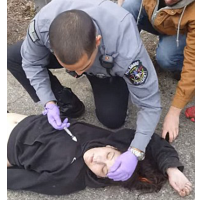Price of Antidote for Heroin Overdose Skyrockets as Much As 500%
 Officer administers Narcan to dying woman who overdosed on heroin (photo: YouTube)
Officer administers Narcan to dying woman who overdosed on heroin (photo: YouTube)
By Christine Stapleton, New York Times
WEST PALM BEACH, Fla. -- The price of Narcan -- the lifesaving heroin-overdose antidote that revives the dying -- has skyrocketed, with one formulation rising more than 500 percent in two years, according to an article published in the New England Journal of Medicine.
Although Narcan first hit the market in 1971, demand has skyrocketed as the opioid epidemic worsens. And with more potent opioids on the street -- such as fentanyl -- first responders, the largest consumers of the drug, are finding they need multiple doses to revive overdose victims.
In 2015, Palm Beach County Fire Rescue spent $55,000 on naloxone -- the generic version of the drug. In the first nine months of 2016, the department had already spent $183,000. These amounts do not include tax dollars spent on the drug in cities with their own police and fire-rescue departments, such as Delray Beach.
The drug is available in several formulations: injectable, nasal spray and auto-injectors -- a single-dose injector designed for people without medical training.
The patented single-dose auto injector sold by Evzio, which provides real-time, audible instructions on how to use the device, has seen the biggest spike. In 2014, a two-pack of single-use prefilled auto-injectors cost $690, according to the article. The current price is $4,500.
The average price of the nasal spray, two pack of single-use device is $150 -- unchanged since it was approved in 2015. This formulation is available at CVS pharmacies in Florida through a statewide, standing prescription.
The average price of the most widely used injectible, a 0.4 mg-per-milliliter vial, has risen 129 percent since 2012, from $62.29 to $142.49.
The authors of the article, published last week, liken the increase to those of Mylan, the manufacturer of the EpiPen.
"The naloxone situation has not garnered the type of attention or outrage inspired by that case, perhaps in part because of the stigma associated with opioid use," according to the article.
Among the recommendations the authors suggest that governments could take:
Purchasing naloxone in bulk, "which would create stable demand that might motivate additional companies to begin manufacturing this medication." This strategy has been used for vaccine manufacturing.
Invoke a federal law to contract with manufacturers on behalf of the federal government to produce less costly versions of Evzio's patented auto-injector in exchange for reasonable royalties -- an approach that was considered for procuring the antibiotic ciprofloxacin during the anthrax threat in 2001.
Allow importation of generics from international manufacturers that meet production standards comparable to those of the Food and Drug Administration.
To promote transparency in drug pricing, lawmakers could follow initiatives like those taken in Vermont, where new legislation requires companies to justify price increases.
In Washington, the recently proposed and bipartisan-supported Fair Accountability and Innovative Research Drug Pricing Act would require makers of certain drugs to report to the Department of Health and Human Services when the price of a drug increases at least 10 percent in a 12-month period.
To Learn More:
The Rising Price of Naloxone — Risks to Efforts to Stem Overdose Deaths (by Ravi Gupta, B.S., Nilay D. Shah, Ph.D., and Joseph S. Ross, M.D., M.H.S.)
400% Increase in Price of EpiPen Allergy Drug Triggers Price-Gouging Lawsuit amid the Firestorm (by Adam Klasfeld, Courthouse News Service)
Drug Industry’s Pricey Meds Behind 8.5% Increase in Americans’ Prescription Spending (by Linda A. Johnson, Associated Press)
Hedge Fund Ethics Hit Drug Industry as “Rare Disease” Loophole Causes Cost of Medicine to Suddenly Skyrocket (by Danny Biederman and Noel Brinkerhoff, AllGov)
Lawmakers Tentatively Challenge Drug Makers over Outrageous Costs for Medicine (by Noel Brinkerhoff and Danny Biederman, AllGov)
- Top Stories
- Unusual News
- Where is the Money Going?
- Controversies
- U.S. and the World
- Appointments and Resignations
- Latest News
- Trump Renames National Football League National Trump League
- Trump to Stop Deportations If…
- Trump Denounces World Series
- What If China Invaded the United States?
- Donald Trump Has a Mental Health Problem and It Has a Name






Comments